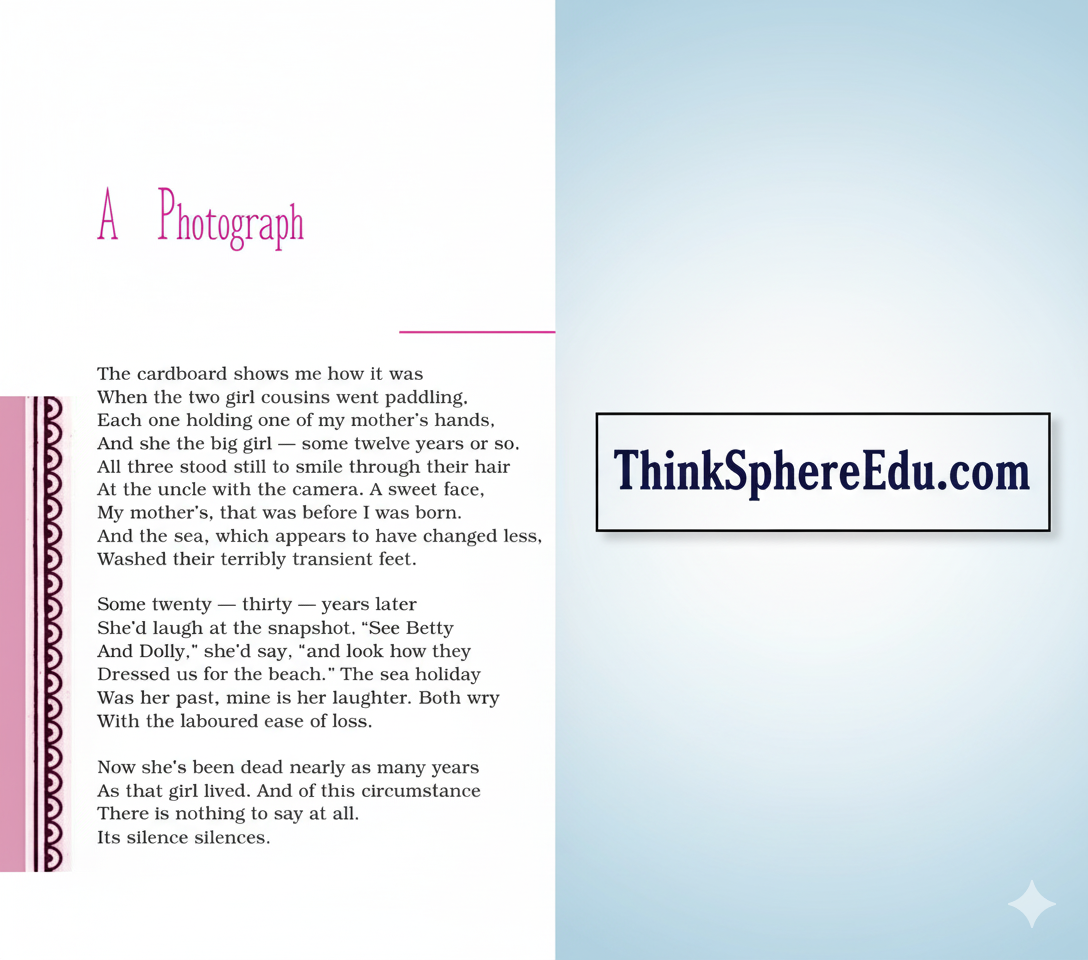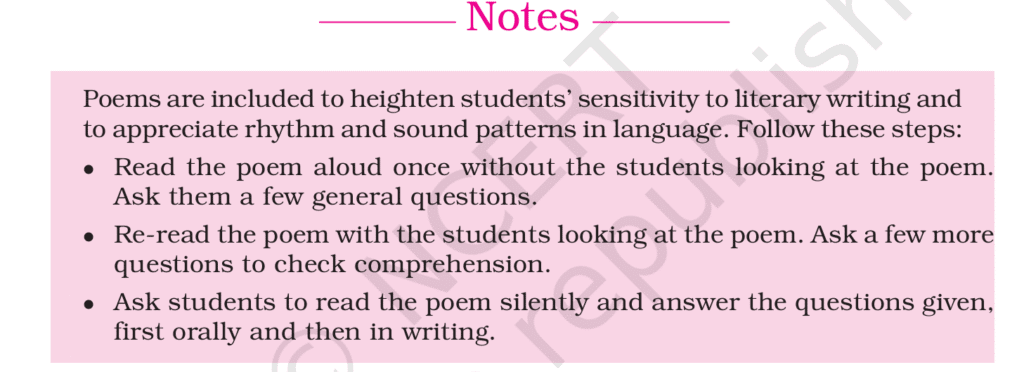
Hornbill | A Photograph Class 11 Questions And Answers Solved | NCERT Solutions & Summary, it is essential for young learners to build a strong foundation in the subject, and CBSE Class 11 English Solutions, Understanding the Chapter thoroughly, helps students grasp key concepts, improve comprehension, and perform well in exams. Also, we provide A Photograph Question Answers and Class 11 English Sample Papers.
In this article we will provide you A Photograph Class 11 Summary in English, Hindi and Bengali pdf.
Table of Contents
A Photograph Class 11 Questions And Answers Solved | NCERT Solutions & Summary
A Photograph Class 11 Summary in English: (A Photograph Class 11 Questions And Answers pdf)
The poem “A Photograph” depicts the poet’s feelings upon finding an old photograph of her mother. The image is of her mother at the age of twelve, standing with her cousins on a beach, all smiling at the camera. The sea is a backdrop to the picture, unchanged, and is in contrast with the ephemeral life of the humans in the photograph.
Years later, the poet’s mother would look at this photograph and laugh and remember the beach holiday and her life as a child. The poet values and reminisces about this laughter. Yet, the poet’s mother is dead, and the poet feels the impact of this situation. The poet states that there is nothing to say, only silence, which represents her deep sense of grief.
The message in the poem conveys the passage of time, change, and loss, where the seashore remains permanent, yet human life is fragile or ephemeral.
A Photograph Class 11 Summary in Hindi: (A Photograph Class 11 Questions And Answers)
कविता “एक तस्वीर” कवि की अपनी माँ की एक पुरानी तस्वीर मिलने पर उसकी भावनाओं को दर्शाती है। यह तस्वीर बारह साल की उसकी माँ की है, जो अपने चचेरे भाइयों के साथ समुद्र तट पर खड़ी है और सभी कैमरे की ओर देखकर मुस्कुरा रहे हैं। समुद्र तस्वीर की पृष्ठभूमि है, अपरिवर्तित, और तस्वीर में मौजूद इंसानों के क्षणभंगुर जीवन के विपरीत है।
सालों बाद, कवि की माँ इस तस्वीर को देखकर हँसती हैं और समुद्र तट की छुट्टियों और अपने बचपन के जीवन को याद करती हैं। कवि इस हँसी को महत्व देते हैं और उसकी यादें ताज़ा करते हैं। फिर भी, कवि की माँ का निधन हो चुका है और कवि इस स्थिति का प्रभाव महसूस करता है। कवि कहता है कि कहने को कुछ नहीं है, बस मौन है, जो उसके गहरे दुःख को दर्शाता है।
कविता का संदेश समय, परिवर्तन और क्षति के बीतने को दर्शाता है जहाँ समुद्र तट स्थायी है, फिर भी मानव जीवन नाज़ुक या क्षणभंगुर है।
A Photograph Class 11 Summary in Bengali: (A Photograph Class 11 Questions And Answers)
“একটি আলোকচিত্র” কবিতাটিতে কবির মায়ের একটি পুরনো ছবি খুঁজে পাওয়ার অনুভূতি চিত্রিত হয়েছে। ছবিটিতে তার বারো বছর বয়সী মা, তার চাচাতো ভাইবোনদের সাথে একটি সমুদ্র সৈকতে দাঁড়িয়ে আছেন, সবাই ক্যামেরার দিকে হাসছেন। সমুদ্র ছবির পটভূমি, অপরিবর্তিত, এবং ছবিতে থাকা মানুষের ক্ষণস্থায়ী জীবনের বিপরীত।
বছরের পর বছর, কবির মা এই ছবিটি দেখে হাসতেন এবং সমুদ্র সৈকতের ছুটি এবং তার শৈশবের জীবনের কথা মনে করতেন। কবি এই হাসিকে মূল্য দেন এবং স্মরণ করেন। তবুও, কবির মা মারা গেছেন এবং কবি এই পরিস্থিতির প্রভাব অনুভব করেন। কবি বলেছেন যে বলার মতো কিছুই নেই, কেবল নীরবতা, যা তার গভীর শোকের অনুভূতিকে প্রতিনিধিত্ব করে।
কবিতার বার্তা সময়, পরিবর্তন এবং ক্ষতির ক্রমবর্ধমানতা প্রকাশ করে যেখানে সমুদ্র সৈকত স্থায়ী থাকে, তবুও মানুষের জীবন ভঙ্গুর বা ক্ষণস্থায়ী।
Class 11 English Hornbill A Photograph Questions from Textbook Solved
1. Infer the meanings of the following words from the context.

Answer:
- ‘Paddling’ means ‘wading’ or ‘rowing’ a boat.
- ‘Transient’ means temporary.
Dictionary Meanings:
- “Paddling” means ‘walking or standing with bare feet in shallow water.’
- “Went paddling” means ‘swam with short movements of hands or feet up and down.’
- “Transient” means ‘staying in a place for only a short time.’
Also Read
- Class 11 English NCERT Solutions Hornbill 2025-26 | Chapter wise free pdf answers
- The Portrait of A Lady Class 11 Questions With Answers Solved
Think It Out (A Photograph Class 11 Questions And Answers)
1. What does the word ‘cardboard’ denote in the poem? Why has this word been used?
Answer:
The word ‘cardboard’ denotes the photograph pasted on a thick paperboard. It has been used to highlight the age of the picture and its fragile, temporary nature compared to the memories and emotions it carries.
2. What has the camera captured?
Answer:
The camera captured a beach scene where the poet’s mother, as a twelve-year-old girl, stood with her two cousins holding her hands, all smiling at the poet’s uncle who took the photograph.
3. What has not changed over the years? Does this suggest something to you?
Answer:
The sea has not changed over the years. It suggests the permanence of nature in contrast to the short and transient span of human life.
4. The poet’s mother laughed at the snapshot. What did this laugh indicate?
Answer:
The poet’s mother’s laugh indicated her fondness and nostalgia for her childhood days. She enjoyed recalling her cousins Betty and Dolly and the dresses they wore during the beach holiday.
5. What is the meaning of the line “Both wry with the laboured ease of loss.”
Answer:
This line means that both the mother and the poet reacted with a mixture of sadness and acceptance to their respective losses. The mother looked back at her lost childhood, while the poet grieved the loss of her mother.
6. What does “this circumstance” refer to?
Answer:
“This circumstance” refers to the death of the poet’s mother and the painful reality of her absence in the poet’s life.
7. The three stanzas depict three different phases. What are they?
Answer:
- First stanza: The childhood of the poet’s mother, captured in the photograph.
- Second stanza: The grown-up mother recalling her childhood with nostalgia.
- Third stanza: The present, where the poet mourns her mother’s death and feels silenced by grief.
Also Read
- Class 11 English NCERT Solutions Hornbill 2025-26 | Chapter wise free pdf answers
- The Portrait of A Lady Class 11 Questions With Answers Solved
Class 11 English Hornbill A Photograph Important Questions And Answers
A Photograph Class 11 Questions and Answers – Very Short Answer Type Questions (1 Mark)
1. Who is the poet of “A Photograph”?
Answer: Shirley Toulson
2. What does the word “cardboard” refer to in the poem?
Answer: The old photograph pasted on thick paper.
3. How old was the poet’s mother in the photograph?
Answer: Around twelve years old.
4. Who accompanied the poet’s mother in the photograph?
Answer: Her two cousins, Betty and Dolly.
5. Who clicked the photograph?
Answer: The poet’s uncle.
6. What has the sea done in the photograph?
Answer: It washed their “transient” feet.
7. What is described as “transient” in the poem?
Answer: Human life (the girls’ feet).
8. What would the poet’s mother say while looking at the photograph?
Answer: She would laugh and recall Betty, Dolly, and their beach dresses.
Also Read
- Class 11 English NCERT Solutions Hornbill 2025-26 | Chapter wise free pdf answers
- The Portrait of A Lady Class 11 Questions With Answers Solved
A Photograph Class 11 Questions and Answers – Short Answer Type Questions (2 Mark)
1. What does the cardboard refer to in the poem?
Answer:
The cardboard refers to the old photograph pasted on a thick paperboard. It shows the poet’s mother as a young girl with her cousins at the beach.
2. How many people are in the photograph?
Answer:
There are three girls in the photograph – the poet’s mother (about twelve years old) and her two cousins, each holding her hand.
3. What does the sea symbolize in the poem?
Answer:
The sea symbolises permanence and timelessness. Unlike human life, which is short and transient, the sea remains unchanged over the years.
4. What was the reaction of the poet’s mother when she used to look at the photograph?
Answer:
The poet’s mother would laugh and recall the beach holiday. She would show the photograph to the poet and talk fondly about her cousins Betty and Dolly.
5. How does the poet react to her mother’s death?
Answer:
The poet feels a deep sense of grief and loss. She finds it difficult to express her feelings in words and accepts silence as the only response.
A Photograph Class 11 Questions and Answers – Long Answer Type Questions (5 Mark)
1. The poem “A Photograph” is a portrayal of loss and nostalgia. Discuss.
Answer:
The poem begins with a description of a photograph of the poet’s mother as a twelve-year-old, enjoying a beach holiday with her cousins. The mother’s laughter while recalling the memory shows her nostalgia for childhood. Later, after her mother’s death, the poet is left only with silence and grief. The photograph becomes a reminder of both her mother’s childhood and her absence. Thus, the poem reflects nostalgia for the past and the deep pain of loss.
2. How does the poet contrast the eternal sea with human life?
Answer:
In the photograph, the sea that touched the feet of the girls remains unchanged even after many years. But the girls grew up, and the poet’s mother eventually passed away. The poet highlights the contrast between the permanence of nature and the short, fragile span of human life. This contrast brings out the theme of change and transience in the poem.
Also Read
- Class 11 English NCERT Solutions Hornbill 2025-26 | Chapter wise free pdf answers
- The Portrait of A Lady Class 11 Questions With Answers Solved
You can read the Notes section for further reference.


7 thoughts on “A Photograph Class 11 Questions And Answers Solved | Best NCERT Solutions & Summary”